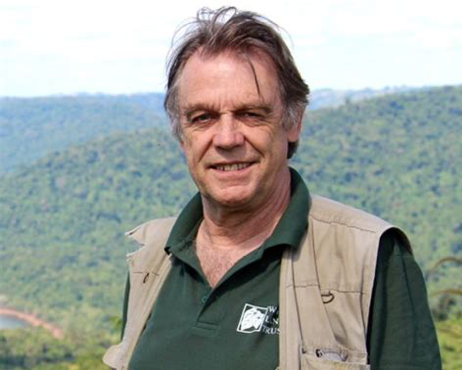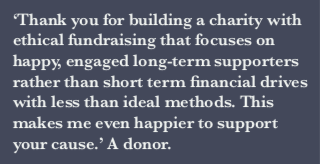Appendix 3: Criticising other charities — World Land Trust’s approach.
In an appendix to his second piece detailing the World Land Trust’s ethical and principled fundraising strategy, John Burton discusses criticising other charities’ approaches. If you agree or disagree with him, please add your thoughts in the comments section below.
- Written by
- John Burton
- Added
- January 02, 2019

Criticising other charities
A few years ago, I had a rant about the problems of charities ‘selling’ goats for as little as £25, as Christmas presents, in my blogs, and these were picked up by newspapers and other media, and received widespread coverage – great publicity for World Land Trust. I even asked Oxfam, on a radio broadcast, if they ever carried out Environmental Impact Assessments of goats in any of their projects. Despite being assured on air they did, I have never seen any evidence that they, Christian Aid, Farm Africa or any of the others ‘selling’ Xmas goats actually do so. And I have yet to meet any conservationist who believes that encouraging more goats in Africa is a good thing. Overall, because of overgrazing and habitat destruction leading to desertification, goats have historically been a cause of poverty, not a solution. And along with cows, camels and other livestock, continue to be so.
So why would charities encourage donors to give goats? But in pointing this out it was me who was publicly attacked simply for criticising another charity. Here, I am raising the issue as to whether or not it is right for one charity to criticise another. To my mind it is obviously a 'no-brainer'. Some charities carry on activities which are clearly in direct opposition to the activities of another. This is often particularly true of religion-based charities, which often promote policies, concerning controlling fertility for instance, in direct opposition to charities with environmental sustainability as a priority. And of course any religious belief based charity is bound to be contra a science-based charity
However, the issue does become more complex if one criticises a charity for its fundraising methods. Many charities use methods which I personally believe to be wrong, and I also believe that the public would not support them if they knew that was how a charity was spending ‘their’ money. There is often debate about such issues in the charity press (magazines and web sites such as Third Sector) but the general public is rarely aware of this. There is the occasional scare story in the press such as the telephone harassment of elderly and vulnerable people. But by and large the public are ignorant of the true costs of fundraising and its relationship with funds raised. How many of the public realise that NONE of their first year or two’s donations may actually go to the project they think they are supporting because the fundraising campaign raised significantly less than it cost? [1]
When I discussed this with Ken Burnett, he pointed out that ‘what you say here is perfectly true, but I think might be put slightly differently or at least explained, so readers can see why charities might do such a thing’. This was a fair comment and Ken went on to explain: ‘The reason charities do this, of course, is because there is considerable value in acquiring a new donor, and charities need to recruit new support not just to grow but to replace donors who die, lose contact or leave for any one of a dozen reasons.’ I accept this as a reason, but still prefer not to go down this route, and I believe the overwhelming majority of WLT donors agree with me.
When a member of the public enquires about costs and overheads, they are generally referred to the charity's accounts, all of which are published on the Charity Commission’s website. But it is virtually impossible to understand how much fundraising really costs, and how much it brought in. This is not actually the fault of the charity, but the way charities have to supply the data and the way charities keep their own records. The result is that the smaller the charity, often the clearer the accountability. Similarly with a small charity it is usually possible to speak with someone who has a good overall picture. And it is usually the larger charities which use the sort of methods I deplore.
But back to my opening issues. I think it is essential that charities do criticise each other. It is only by highlighting failures as well successes so that the public can make sensible, informed judgements as to which charities to support, and not base decisions simply on the marketing And criticism does not have to be negative. It can often lead to very positive results. Over the 27 years I was CEO of World Land Trust (WLT) I always tried to respond to any criticism of WLT, and also make sensible comments on the sector as a whole. I have never made a secret of the fact that I really don’t like WWF (or others) giving away cuddly toys, and constantly using snow leopards (or other ‘charismatic’ species) to raise funds, without disclosing exactly how much is spent on the advertising and the follow up, and how much it brings in, and how much is actually spent on conserving snow leopards. There are different fundraising models and I feel we all have the right to speak out and criticise, as unfortunately when there is a major scandal, all charities tend to be tarred with the same brush. My belief is that being very explicit about our methods, and being as transparent as possible, is one of the reasons that WLT weathered the recession well, and continues its slow, but steady growth. In fact I would go so far as to claim one of the reasons quite a lot of our supporters are so loyal to us is because we criticise when it is due, and are open about it. By being outspoken and even controversial, we ensure that our audience is deeply committed, and understand the issues.
[1] A point that needs clarification is that WLT actually did invest as much of its income as possible in developing and increasing its supporter base. But the overwhelming bulk of the income was restricted. By agreeing to take an overhead (and being transparent about it being 15%-18%) on all restricted income, we were able to finance our core activities. And while it may appear from our accounts that we are sitting on £1million or more in ‘safe investments’ of the type that Burnett criticises, the reality is that those funds are restricted endowment funds, and there are considerable restrictions on how they can be invested, placed on them by the donor. I have no doubt, that were a donor to give us funds and say here is £100,000 spend it how you think best for the Trust, we would invest on supporter development. But the nearest it ever comes to that is when a donor say ‘spend it on which ever (conservation) project you think is the priority’.
Editor’s note. The context behind this series:
This short series from John Burton sets out to capture in detail one CEO’s view of fundraising and how it should or shouldn’t be done. SOFII is publishing it in the belief that CEO/ senior management team perspectives on fundraising are rare and of value. As such, it’s an opinion article, not a case history and it contains views that many readers might disagree with. So, please do add your comments and opinions below, as this will provide a more rounded view, encourage debate and advance understanding of the subjects and issues raised. The context behind this one individual’s critical perspective on how fundraising should or shouldn’t be done is the author’s 40+ years of voluntary sector leadership throughout which he has worked with and supported fundraisers and their teams and listened to the views of many donors. While SOFII suspects the author is being deliberately provocative in places, this experience has led John and his charity to adopt some practices and avoid others. So, SOFII welcomes constructive comment from all fundraisers, whether arguing against his views or supporting them.


















